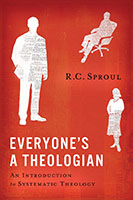Reviewed by Bradley G. Green
I remember with joy the days when I first began to read theology. I cut my teeth on a number of popular theological works, and benefitted immensely. If there is a weakness amongst academic theologians (and by the way, there are many), it is to look down one’s nose at books written at an introductory level. Sorry, I am not interested in playing that game. There is a need for books written at an accessible level. And that is what this book is.
R.C. Sproul’s Everyone’s a Theologian is just what the subtitle says – an introduction to systematic theology. It will be helpful to many, particularly someone who is just cutting his theological teeth. R.C. Sproul has spent decades writing at an accessible level, and communicating Reformed theology to many readers.
Everyone’s a Theologian follows a traditional format. It consists of eight main parts: Introduction, Theology Proper (doctrine of God), Anthropology and Creation, Christology, Pneumatology, Soteriology, Ecclesiology, Eschatology.
Sproul’s Everyone’s a Theologian is a very basic introduction to theology. It has the characteristic strengths of Sproul’s writings: accessibility, clarity, and the uncanny ability to communicate difficult truths well.
I will note three weaknesses. First, the brief discussion of many topics means a number of issues can be barely touched upon. Hence, the beauty and profundity of theology is perhaps unrealized at points. For example, when Sproul discusses the covenants he writes: “Theologians speak in general of three major covenants in Scripture, the covenant of redemption, the covenant of works, and the covenant of grace” (p. 121). Now certainly some theologians – a certain strand of the Reformed tradition – speak this way. But my, what a world of writing has wrestled with the best way to speak of the biblical covenants. The reader who is new to theology would not know – from reading Sproul here – that this is a very contested issue. Again, brevity can be wonderful, but it can conceal as much as it reveals.
Second, the book has very few notes or references. Sproul at a number of points references his own works (no vice), but there are very few references to other works which might strengthen or illuminate his text.
Third, there is not list of further readings, or suggestions for where to go next. A book of this sort would be strengthened by pointing the reader to where to go next.
This book would be a helpful read for the person wanting a basic introduction to a certain strand of Reformed theology. Another introductory book of similar level would be J.I. Packer’s Concise Theology. While Sproul’s book useful, the reader would then need to forge ahead with some of the luminaries of the Reformed tradition – Calvin, Turretin, Edwards, Hodge, Warfield, etc. But who of us has not benefitted from good summaries and introductions?
Dr. Bradley Green is Associate Professor of Christian Thought and Tradition at Union University and Review Editor for Systematic Theology here at Books At a Glance.
Buy the books

Everyone's A Theologian